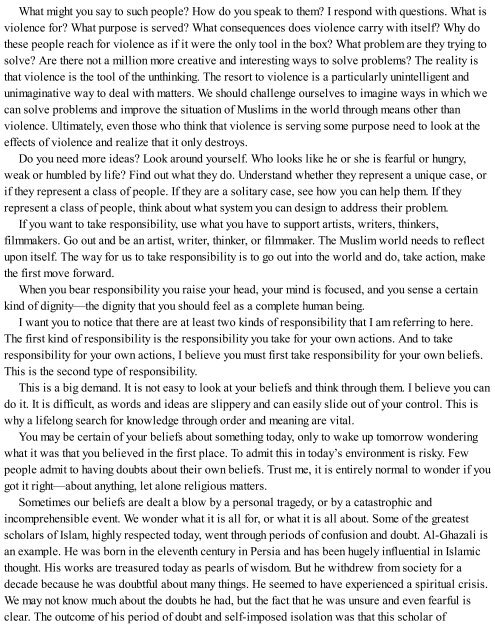1250119847
Create successful ePaper yourself
Turn your PDF publications into a flip-book with our unique Google optimized e-Paper software.
What might you say to such people? How do you speak to them? I respond with questions. What is<br />
violence for? What purpose is served? What consequences does violence carry with itself? Why do<br />
these people reach for violence as if it were the only tool in the box? What problem are they trying to<br />
solve? Are there not a million more creative and interesting ways to solve problems? The reality is<br />
that violence is the tool of the unthinking. The resort to violence is a particularly unintelligent and<br />
unimaginative way to deal with matters. We should challenge ourselves to imagine ways in which we<br />
can solve problems and improve the situation of Muslims in the world through means other than<br />
violence. Ultimately, even those who think that violence is serving some purpose need to look at the<br />
effects of violence and realize that it only destroys.<br />
Do you need more ideas? Look around yourself. Who looks like he or she is fearful or hungry,<br />
weak or humbled by life? Find out what they do. Understand whether they represent a unique case, or<br />
if they represent a class of people. If they are a solitary case, see how you can help them. If they<br />
represent a class of people, think about what system you can design to address their problem.<br />
If you want to take responsibility, use what you have to support artists, writers, thinkers,<br />
filmmakers. Go out and be an artist, writer, thinker, or filmmaker. The Muslim world needs to reflect<br />
upon itself. The way for us to take responsibility is to go out into the world and do, take action, make<br />
the first move forward.<br />
When you bear responsibility you raise your head, your mind is focused, and you sense a certain<br />
kind of dignity—the dignity that you should feel as a complete human being.<br />
I want you to notice that there are at least two kinds of responsibility that I am referring to here.<br />
The first kind of responsibility is the responsibility you take for your own actions. And to take<br />
responsibility for your own actions, I believe you must first take responsibility for your own beliefs.<br />
This is the second type of responsibility.<br />
This is a big demand. It is not easy to look at your beliefs and think through them. I believe you can<br />
do it. It is difficult, as words and ideas are slippery and can easily slide out of your control. This is<br />
why a lifelong search for knowledge through order and meaning are vital.<br />
You may be certain of your beliefs about something today, only to wake up tomorrow wondering<br />
what it was that you believed in the first place. To admit this in today’s environment is risky. Few<br />
people admit to having doubts about their own beliefs. Trust me, it is entirely normal to wonder if you<br />
got it right—about anything, let alone religious matters.<br />
Sometimes our beliefs are dealt a blow by a personal tragedy, or by a catastrophic and<br />
incomprehensible event. We wonder what it is all for, or what it is all about. Some of the greatest<br />
scholars of Islam, highly respected today, went through periods of confusion and doubt. Al-Ghazali is<br />
an example. He was born in the eleventh century in Persia and has been hugely influential in Islamic<br />
thought. His works are treasured today as pearls of wisdom. But he withdrew from society for a<br />
decade because he was doubtful about many things. He seemed to have experienced a spiritual crisis.<br />
We may not know much about the doubts he had, but the fact that he was unsure and even fearful is<br />
clear. The outcome of his period of doubt and self-imposed isolation was that this scholar of
















